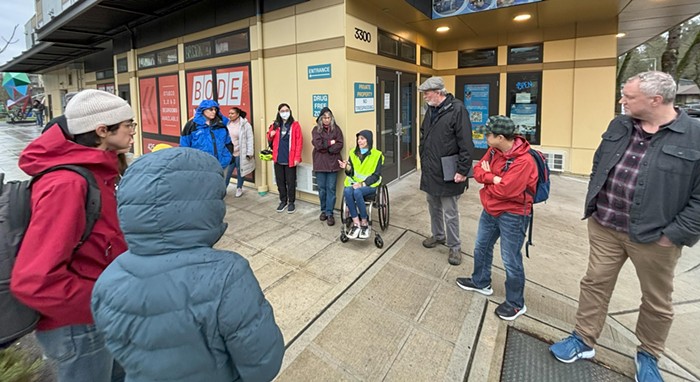The Seattle Police Department (SPD) is once again asking the City to fund a surveillance package that includes a ShotSpotter subscription and closed-circuit television cameras (CCTV). And once again, the city council should loudly and unanimously reject the department’s request.
Multiple studies raise questions about the accuracy of such acoustic gunshot detection technology, and the city could spend the $1.8 million proposal on other programs that would actually improve public safety. Moreover, SPD’s failure to vet the technology with the City suggests that their request only aims to increase the size of the department’s budget for its own sake.
What Is ShotSpotter?
ShotSpotter, which is now called “SoundThinking,” hires staff to identify gunshots by listening to audio recordings of loud sounds captured by microphones installed in certain areas of a city. Though the company uses an algorithm to initially select those sounds for staff review, the system boils down to people sitting hundreds of miles away, listening to audio recordings of loud sounds.
Though its marketing suggests otherwise, ShotSpotter won’t say its technology prevents crimes, leads to any evidence, or prevents loss of life. Several studies show the wisdom of not backing such claims.
Independent, peer reviewed research put ShotSpotter’s false positive rate at 90% in Chicago, a city with CCTV cameras. The City of Atlanta documented a false alert rate of 97%. A 2018 study found that SENTRI, another acoustic gunshot detection system, had terrible accuracy. Those numbers shouldn’t surprise too many paying customers. In its contracts, the ShotSpotter promises to flag a certain percentage of actual gunshots (with many caveats), but it makes no promises about issuing false alerts, which gives the company a financial incentive to call almost everything a gunshot.
One report found their service offered no preventative or evidentiary value, and it reportedly increased biased policing of majority-minority neighborhoods regardless of whether or not departments combined the service with CCTV cameras. Furthermore, a massive meta-analysis of 68 cities found ShotSpotter led to no significant impact on firearm-related homicides or arrest outcomes. This is consistent with a report by the Chicago Office of Inspector General, which found “responses to ShotSpotter alerts rarely produce evidence of a gun-related crime, rarely give rise to investigatory stops, and even less frequently lead to the recovery of gun crime-related evidence during an investigatory stop.” Finally, a Hartford study looked into whether ShotSpotter could get gun violence victims to safety faster and found no benefit.
ShotSpotter Still Needs to Pass Seattle’s Surveillance Tests
Even if SPD wanted to roll with this dubious technology right now, the department would run into trouble with the law. SPD cannot purchase either ShotSpotter or CCTVs at the moment because it has not received an approved Surveillance Impact Report (SIR) as required by Seattle’s Surveillance Ordinance, a piece of legislation then-Council President Bruce Harrell sponsored and voted for.
The Surveillance Ordinance protects the people of Seattle from suddenly and unexpectedly finding themselves subject to invasive surveillance technology because five people fell for a sales pitch. These impact reports take a significant amount of time to conduct to ensure the community has a chance to fully review, understand the implications of, and approve of surveillance technologies.
We see nothing to indicate that SPD has filed to get an SIR for ShotSpotter, despite them having asked the council to fund these technologies over a year ago and despite Deputy Mayor Tim Burgess saying he raised the idea yet again in late August.
Nothing about the City Council’s decision not to fund these technologies last year prevented SPD from conducting a SIR and then purchasing a ShotSpotter subscription and/or CCTV cameras using the money in its current budget, which amounts to $374.3 million for 2023. The department demonstrated as much with Truleo, an AI system cops use to examine body cam footage, which raised significant privacy and civil liberty concerns. After the Council denied SPD’s specific funding request for Truleo in the 2022 budget, the department went ahead with the SIR process and ultimately purchased it without ever going back to the Council again. (Staff decided not to classify Truleo as a surveillance technology, so the Council did not have to approve a SIR for it).
If SPD really wanted ShotSpotter and CCTV cameras, then the department would have already submitted a SIR to the council so it could position itself to actually purchase these technologies. Instead, all SPD did over the last 13 months was write a new memo asking for more money again. With less than two months left of budget season, SPD’s failure to file for an SIR may point to an attempt to rush the process, or prejudice an approval decision, since they could cite the council’s approval of funds as evidence in their favor. Or, the department’s lack of action could just point to a cynical attempt to suck up as much money as possible–they don’t really care about ShotSpotter and CCTV, they just want the money and to flex the power that comes from one department corning a quarter of Seattle’s general fund. (Similar to SPD constantly clutching vacant “ghost cop” positions that it has no plan or intention to fill).
Spend the Money on Other Stuff
It is hard to imagine a Seattleite whose top priority (or even tenth priority) involves squirreling away $1.8 million just in case SPD ever gets around to filing for an SIR and obtaining approval. And even if the department succeeds in that effort, its current 2024 budget of $384.9 million is more than adequate enough to cover the cost. Rather than allocate the money for dubious tech, the Council could use the nearly $2 million to address some real, urgent needs, including:
- Eliminate cuts in the proposed budget to ADA compliance and make the entire city accessible to everyone.
- Eliminate cuts to Vision Zero. As of this writing, 22 people have been killed in traffic collisions so far this year, predominantly people walking, rolling, or biking.
- Partially restore cuts to affordable housing that come from $84 million of “JumpStart” payroll tax revenue that is being used to pay for general fund items.
- Guaranteed Basic Income (GBI) for about 90 people. GBI is one of the most cost effective ways to improve health for recipients and their children; increase income, housing, and food security; increase employment; and reduce unplanned pregnancies, firearm violence, and addiction.
- Fund Seattle’s first overdose prevention center, a service proven to reduce overdose deaths.
- Restore funding for meal providers so they can maintain their level of service next year.
- A program for domestic violence survivors based on an evidence-based model of survivor-driven mobile advocacy with flexible financial assistance. Survivors need immediate advocacy designed to support their self-determination and unique safety needs.
- Increase funding for violence interruption programs, which have proven incredibly effective at reducing violence.
- Fund an almost 2% raise for human services workers to align with Resolution 32094, which pledged to give human services workers a 7% raise by 2025, and also with a University of Washington Wage Equity Study, which found human services workers are underpaid by 37%.
- Increase funding for the Storefront Repair Fund.
- 24/7 public bathrooms.
The City has the unfortunate habit of showering SPD with money for whatever it wants while simultaneously claiming to lack resources when anyone else asks to fund important services and programs. But we must be clear on this point: that particular habit is a choice. Right now, we can choose to wall off $1.8 million for an invasive technology that has been shown not to work to meet the City’s public safety goals and that SPD cannot legally purchase at the moment, or we can choose to invest that money in the things that people in this city actually need right now to survive and even begin to thrive.
BJ Last is a business analyst with over a decade of budgeting experience across a wide range of industries. He lives in Ballard and supports the Solidarity Budget.
Camille Baldwin-Bonney is a long-time Seattle resident, a mother, and a health care worker. She volunteers for People Power Washington, where she advocates for equitable public safety and supports the Solidarity Budget.



















